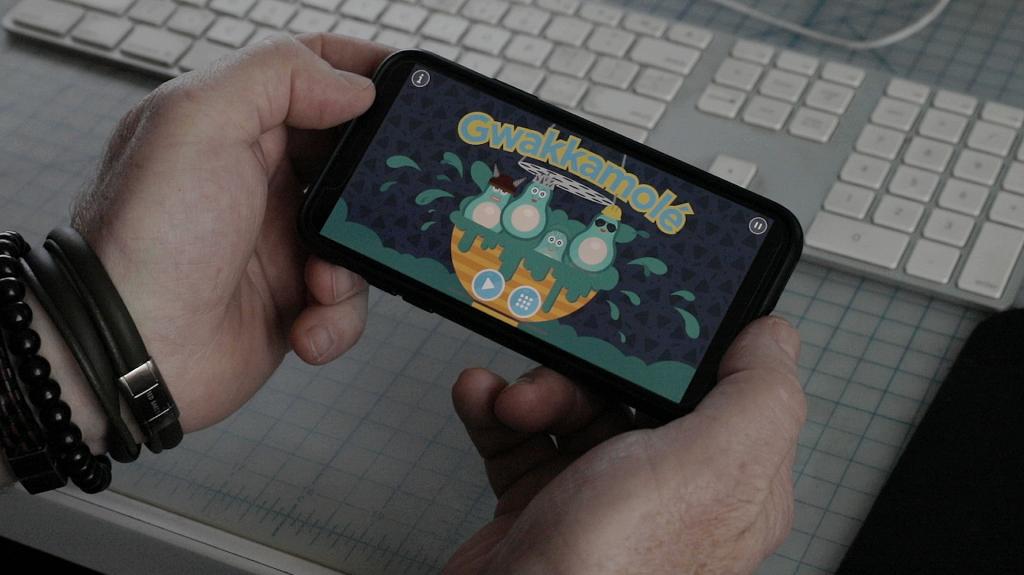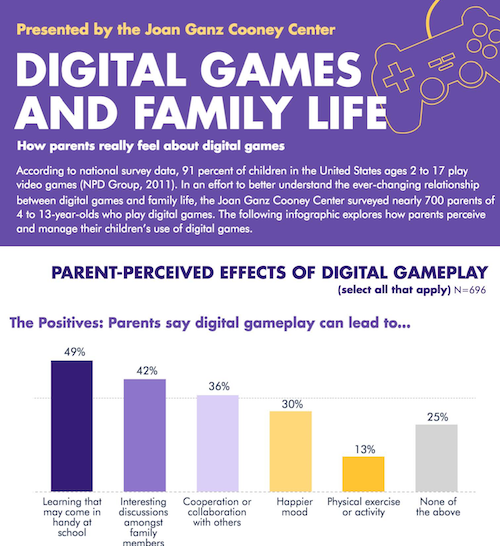The newest Digital Games and Family Life infographic from the Joan Ganz Cooney Center puts “Mario” in big navy blue letters. It seems Nintendo’s classic is the video game franchise that parents are most likely to enjoy playing just as much as their kids do.
 I’m not surprised. My children (two boys, 9- and 11-years-old) and I have been enjoying the new NES Classic ever since Nintendo sent us a review unit in early November. The retro all-in-one mini-console delivers an intense shot of nostalgic bliss. The classic theme music. The familiar feel of the rectangular controller. I find myself transformed into a kid again. Nintendo somehow made the picture and the sounds clear enough that old games come across as fresh and modern, even on our Vizio 4K Television. Are video games like old Beatles records? Do you call it remastering? Everything seems sharper than I remember it. The controls might even be more responsive. This is NES the way I always wanted to be—even better than the original.
I’m not surprised. My children (two boys, 9- and 11-years-old) and I have been enjoying the new NES Classic ever since Nintendo sent us a review unit in early November. The retro all-in-one mini-console delivers an intense shot of nostalgic bliss. The classic theme music. The familiar feel of the rectangular controller. I find myself transformed into a kid again. Nintendo somehow made the picture and the sounds clear enough that old games come across as fresh and modern, even on our Vizio 4K Television. Are video games like old Beatles records? Do you call it remastering? Everything seems sharper than I remember it. The controls might even be more responsive. This is NES the way I always wanted to be—even better than the original.
There’s more. Yesterday, in the doctor’s waiting room, we played tug-o-war with my son’s iPod touch. It was a struggle to decide which one of us got the first chance to play Super Mario Run—Nintendo’s new mobile game. I won. Like an updated legacy brand, my inner 10-year old has been remastered for my adult body. I’m stronger, sharper, and more confident than I used to be. And I can see from the way their faces light up that my kids love it when pre-teen Jordan replaces work-all-day Dad.
Honestly, it doesn’t happen all that much, but when it does, video games are usually involved. Screen time is often family time in our home; it’s one of the many ways we bond. Together, we play games before dinner and watch television or movies afterward.
On the evenings when I have custody, the three of us are always next to each other in the living room. They are immersed in the world of their laptops—gaming, watching YouTube videos, writing, presenting absurdist PowerPoint presentations to one another. I answer email, tie up the day’s loose-ends.
If the technophobes walked into our house during the late afternoon, they would cringe. It looks like we’re all focused on our own devices. But I think they’re missing the big picture. When you see it as part of our everyday routine, it looks like ordinary parallel play. We are focused on separate tasks, but very much together. Like an old married couple reading the paper over Sunday morning coffee, we call out interesting tidbits to one another. We share the things that make us laugh; we tell little stories of our experiences from throughout the day.

As soon as I’m done with my work, I put a video game up on the television. That gets their attention. They close their devices and join me almost immediately. I don’t even need to ask. They start hooting and hollering. “Dad, go over there! Get that guy! Jump! Now!” I’m not surprised to discover that the infographic says 61% of parents “rarely or never” coach their kids on playing the game. Usually they are the ones coaching me.
If we’re playing a new game that I’m planning to write about, we talk about it in detail. My sons can get really critical, really quickly. But I can tell from the way they talk that they’re just trying to sound smart. They want to impress me with thoughtful critiques, to say something that I’ll publish. I see a similar phenomenon in my college classroom: I’ll ask students to share their thoughts with their classmates, but since they keep looking back to me for approval, I know that they’re really testing out new perspectives, new ways of being, new ways to identify as mature, critical-thinking adults. It’s a good thing. Undergrads do it in response to academic material, pre-teens are much more easily motivated by video games. Either way, they are learning.
After a while, I step away from the gaming console. Like 38% of parents, I start in on daily chores, multitasking to make dinner, run a few loads of laundry, straighten up the house, while the kids keep playing. Soon, the three of us will eat dinner at the table together. We do it every night, but not because I believe in the sanctity of the family dinner. Most of that research is tied up in a politically motivated conception of “family values,” an issue of subjective morality, not child development.
Let’s be clear: that 1950s Leave It To Beaver image of the perfect weekday dinner table has never really existed in most American homes. But still, it’s a concept loaded with baggage—a source of shame, guilt, and endless social pressure.
According to Stephanie Coontz, author of The Way Things Never Were, Teddy Roosevelt was first among industrial era politicians who “warned that the nation’s future rested on ‘the right kind of home life.’” Almost a century later, Ronald Reagan added his voice to a slew of others, saying that “strong families are the foundation of society.” And now, it seems to be a commonly accepted, albeit misguided, assumption that many of our social problems can simply be blamed on “bad parenting.”
All that moralizing doesn’t serve anyone. Least of all children. Family meals are certainly good for kids, but they are not the magic solution to everything. They work because children need grownups in their lives who consistently talk to them, grownups who challenge their thinking, grownups who model positive ways of being. Neither the location nor the activity is the important variable here. You can also get a whole lot of positive developmental mileage from sharing time with the video game console. There’s even some evidence suggesting that family play time can be more beneficial than family meal time.
That’s good news for Mario. For some time now, Nintendo has been successfully staking out their territory as the “family” game company. And earlier this year, they commissioned Wakefield Research to conduct a survey of families, finding that parents tell their kids, “I’m too busy to play with you” at least once a day. In addition, 48 percent of parents said they “spend more time commuting to work than playing with their kids.” Sounds bleak. But Nintendo must have been thrilled to discover (and share) that 60% of parents (70% of dads and 52% of moms) report playing video games with their kids.
Compare Nintendo’s results with the Joan Ganz Cooney Center’s finding that 76% of parents say “that there are certain game titles that they enjoy playing just as much as their kids do.” Clearly, when it comes to video games, we’ve got a recipe for a new kind of “family meal.”
See the full infographic here and learn more about the series here.



